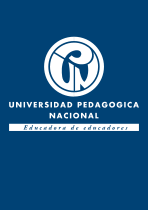Enseñar y aprender a leer en inglés : creencias de futuros docentes de lengua extranjera chilenos.

Citación
Fecha
2020-05-29Autor
Tagle Ochoa, Tania
Schuster Muñoz, Cecilia
Rojas Caro, Viviana
Campos Espinoza, Mónica
Ubilla Rosales, Lucia
Flores Gajardo, Luzmila
Briesmaster, Mark
Enlace al recurso
https://revistas.pedagogica.edu.co/index.php/RF/article/view/11778Palabras claves
Formación de docentes
Creencias
Comprensión lectora
Enseñanza de idiomas
Aprendizaje de idiomas
Keyword
Teacher educationBeliefs
Reading comprehension
Language teaching
Language learning
Formação de professores
Crenças
Compreensão de leitura
Ensino de línguas
Aprendizagem de línguas
Metadatos
Mostrar el registro completo del ítemResumen
El objetivo del presente artículo derivado de investigación es develar las creencias sobre el proceso de enseñanza y aprendizaje de la habilidad de comprensión lectora que poseen estudiantes de Pedagogía en inglés de una universidad chilena. Se siguió una metodología cualitativa de investigación, empleando un estudio de caso. Los participantes fueron 20 futuros docentes, que estaban cursando su segundo año de formación. Se recogió información a través de una entrevista semiestructurada. Los datos se analizaron utilizando el software Atlas.Ti. Los resultados plantean que los participantes poseen creencias sobre esta habilidad basadas en las formas de procesamiento ascendente y descendente de la información. Al respecto, se señala que los futuros maestros requieren configurar una visión sobre la comprensión lectora desde una perspectiva estratégica. En este contexto, se sugiere que las instituciones formadoras de profesores de inglés los incentiven a realizar prácticas metacognitivas para transformar sus creencias tradicionales.
Abstract
The objective of the present article derived from research is to unveil the beliefs about the teaching and learning process of the reading comprehension skill that students of Pedagogy in English possess at a Chilean university. The authors followed a qualitative research methodology through a case study. The participants were 20 future teachers, who were in their second year of education. The authors conducted a semi-structured interview and analyzed the participants’ answers using the Atlas.Ti software. The findings suggest that the participants hold beliefs concerning reading skills in English which are based on both bottom-up and top-down ways of processing information. In this respect, the authors state that future teachers need to build up a new look at reading comprehension from a strategic approach. In this context, it is suggested that English teacher training institutions encourage them to carry out metacognitive practices to transform their traditional beliefs.
Editorial
Editorial Universidad Pedagógica Nacional
Fuente
Colecciones
- Revista Folios [571]
